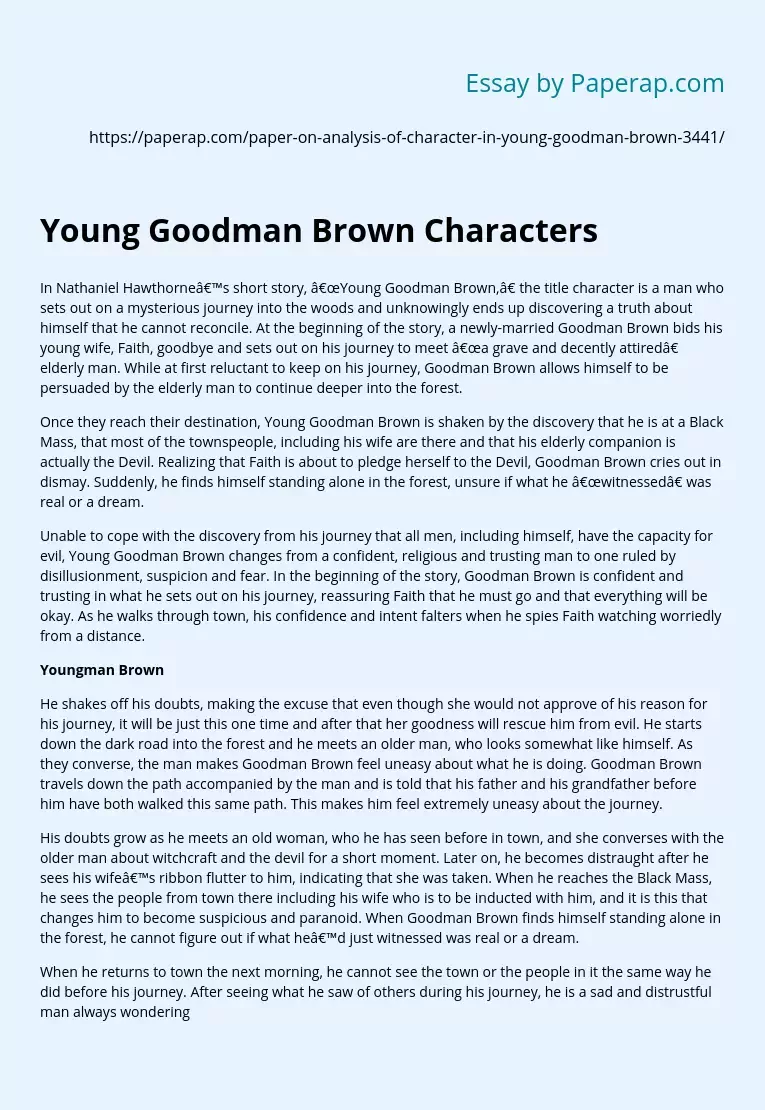Young Goodman Brown Characters
In Nathaniel Hawthorne’s short story, “Young Goodman Brown,” the title character is a man who sets out on a mysterious journey into the woods and unknowingly ends up discovering a truth about himself that he cannot reconcile. At the beginning of the story, a newly-married Goodman Brown bids his young wife, Faith, goodbye and sets out on his journey to meet “a grave and decently attired” elderly man. While at first reluctant to keep on his journey, Goodman Brown allows himself to be persuaded by the elderly man to continue deeper into the forest.
Once they reach their destination, Young Goodman Brown is shaken by the discovery that he is at a Black Mass, that most of the townspeople, including his wife are there and that his elderly companion is actually the Devil. Realizing that Faith is about to pledge herself to the Devil, Goodman Brown cries out in dismay. Suddenly, he finds himself standing alone in the forest, unsure if what he “witnessed” was real or a dream.
Unable to cope with the discovery from his journey that all men, including himself, have the capacity for evil, Young Goodman Brown changes from a confident, religious and trusting man to one ruled by disillusionment, suspicion and fear. In the beginning of the story, Goodman Brown is confident and trusting in what he sets out on his journey, reassuring Faith that he must go and that everything will be okay. As he walks through town, his confidence and intent falters when he spies Faith watching worriedly from a distance.
Youngman Brown
He shakes off his doubts, making the excuse that even though she would not approve of his reason for his journey, it will be just this one time and after that her goodness will rescue him from evil. He starts down the dark road into the forest and he meets an older man, who looks somewhat like himself. As they converse, the man makes Goodman Brown feel uneasy about what he is doing. Goodman Brown travels down the path accompanied by the man and is told that his father and his grandfather before him have both walked this same path. This makes him feel extremely uneasy about the journey.
His doubts grow as he meets an old woman, who he has seen before in town, and she converses with the older man about witchcraft and the devil for a short moment. Later on, he becomes distraught after he sees his wife’s ribbon flutter to him, indicating that she was taken. When he reaches the Black Mass, he sees the people from town there including his wife who is to be inducted with him, and it is this that changes him to become suspicious and paranoid. When Goodman Brown finds himself standing alone in the forest, he cannot figure out if what he’d just witnessed was real or a dream.
When he returns to town the next morning, he cannot see the town or the people in it the same way he did before his journey. After seeing what he saw of others during his journey, he is a sad and distrustful man always wondering about other people’s true motives. Now, he looks at Faith, not with joy and love, but with suspicion and condemnation. His determination to avoid evil, doesn’t allow him to appreciate the good he has in his life. When Goodman Brown dies years later, a bitter old man with numerous family members and friends in attendance at his funeral, no one can think of one good thing about him to put on his tombstone.
In this story, Goodman Brown starts out trusting and confident, but ends up fearful and suspicious when he discovers that all men, including himself, have the capacity for evil. His loss of faith in himself to overcome this evil, turns him bitter unable to truly love his wife and to see the good in life. In the end, his attempts to keep away from evil by silently condemning everyone around him, he ends up seen by everyone else as a sad man without hope.
Young Goodman Brown Characters. (2019, Dec 05). Retrieved from https://paperap.com/paper-on-analysis-of-character-in-young-goodman-brown-3441/

